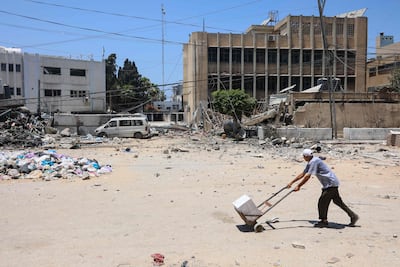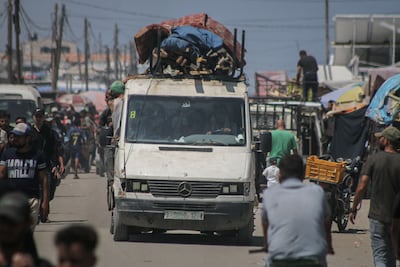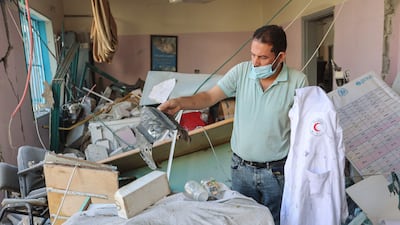Live updates: Follow the latest news on Israel-Gaza
Several Palestinian civilians and health workers were killed as air strikes on the Gaza Strip continued on Monday despite Israeli Prime Minister Benjamin Netanyahu saying the war would wind down.
Mr Netanyahu said the current phase of intense fighting would end "very soon" and the army would be shifting to more targeted operations against Hamas. He reaffirmed the war would not end until the group is defeated.
He said this would allow for some Israeli forces to be redeployed to the north, along the Lebanese border, where clashes with Hezbollah have intensified and concerns of a wider war there grow.
But residents told The National talks of reduced operations are "all lies" and that the exact opposite is taking place on the ground.
"After the intense phase is finished, we will have the possibility to move part of the forces north. And we will do this," the Prime Minister told pro-Netanyahu Channel 14 on Sunday in his first broadcast interview since the start of the war.
Similar comments were made by Israeli Defence Minister Yoav Gallant ahead of his visit to Washington where he is set to discuss the situation in Gaza and Lebanon with US officials.
“The transition to Phase C in Gaza is of great importance. I will discuss this transition with US officials, how it may enable additional things and I know that we will achieve close co-operation with the US on this issue as well,” Mr Gallant said of the aim to reduce operations in the besieged enclave.
But despite these claims of fighting being scaled down, air strikes across the strip continue to inflict casualties and locals say the exact opposite is taking place.
“We've heard a lot that the Israeli army has moved to the third phase in northern Gaza and according to the media this phase is supposed to involve more targeted strikes and a decrease in the intensity of the war," Muhi Al Din, a resident of Gaza city, told The National on Monday.
"But what we see today is the opposite of what we're hearing."

Two health workers were killed in Israeli strikes in central Gaza, Wafa news agency reported on Monday. Gaza's Health Ministry said the director of the Ambulance and Emergency Department was killed while the Israeli army said it had killed a senior Hamas commander.
The ministry said the killing of Hani Al Jaafarawi raised the number of medical staff killed since October 7 to 500.
"The intensity of the attacks hasn't decreased, on the contrary, they are clearly increasing," Mr Al Din said of the targeting of central and northern Gaza.
Mona Kahlout, who also lives in Gaza city, said: “The talk about reduced bombings is all lies, the shelling hasn't stopped for us here in the north."
She said people were afraid to leave their homes because of the bombing.
"Hunger is consuming us and death surrounds us everywhere," but the risk to search for food is too high, she said.
On Sunday night, eight Palestinians were killed in a strike on a training college run by the UN Palestinian refugee agency near Gaza city, Reuters reported.
The Israeli army said the site was being used by Hamas and Islamic Jihad militants. The Palestinian groups deny accusations they use civilian infrastructure for military purposes.

Residents said Israeli tanks were advancing into Rafah, reaching Al Mawasi refugee camp where hundreds of displaced Palestinians are taking refuge.
Palestinian Civil Defence said at least seven others were killed in a separate strike on Sabra neighbourhood in Gaza city.
Officials have said the third and final phase of the Israeli offensive in Gaza would see fighting winding down to smaller-scale operations.
In terms of continuing ceasefire efforts, Mr Netanyahu said he was ready for a partial deal under which about 120 Israeli hostages still held in Gaza would be returned but he remained "committed to continuing the war after a pause, in order to complete the goal of eliminating Hamas".
Hamas and Israel appear to be distancing themselves further from the US-backed ceasefire proposal despite efforts by mediators to bring them closer to an agreement.
Under the three-phase ceasefire plan, the remaining hostages would be released in exchange for hundreds of Palestinians detained in Israel. Hamas has insisted it would not release the captives unless Israel commits to a permanent ceasefire and full withdrawal from Gaza. Mr Netanyahu's remarks indicate he rejects a deal that would put an end to the fighting without the Palestinian militant group's defeat.

